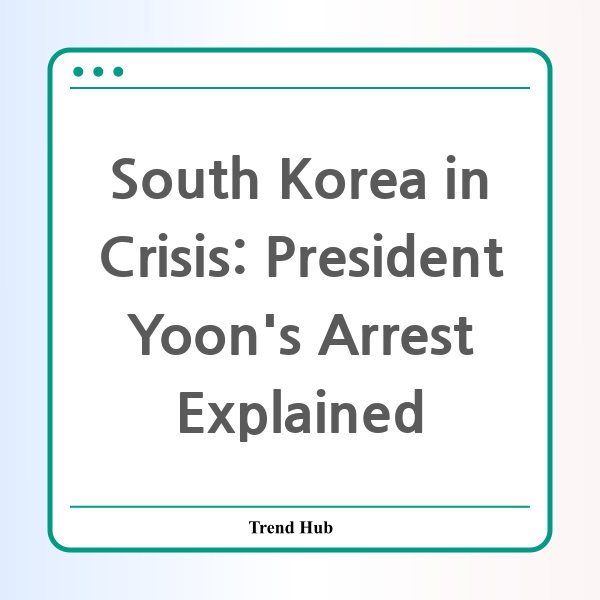* This website participates in the Amazon Affiliate Program and earns from qualifying purchases.

What happens when a sitting president is arrested? This question looms large in South Korea as President Yoon Suk Yeol faces the most significant political turmoil in recent memory. His recent arrest by anti-corruption investigators marks a historic moment for South Korean politics, shaking the country's already fragile political landscape.
Yoon's troubles began with a surprise martial law declaration that ignited widespread backlash and fears of authoritarianism. This bold move was announced late at night on December 3 and claimed to protect the nation from supposed anti-state elements. However, the declaration was swiftly overturned by members of the National Assembly, including those from Yoon's own political party, reflecting a clear lack of support for his governance.
Following his controversial actions, Yoon has been under intense scrutiny. After weeks of evading arrest, he was finally taken into custody by the nation’s Corruption Investigation Office (CIO). This unprecedented event marks the first time in South Korea's democratic history that a sitting president has been arrested, raising questions about the very foundation of power in the nation.
The legal challenges facing Yoon are serious. He has been accused of leading an insurrection, a crime that carries penalties ranging from considerable prison time to the death penalty. This is not just a simple investigation; it is intertwined with varying political agendas and a populace that is significantly divided in their opinions about his leadership.
As Yoon sits in detention, the atmosphere outside his residential compound is electric. Supporters and protesters alike have gathered in large numbers, some chanting calls for Yoon’s resignation, while others demand his release, showcasing the divided sentiments among the Korean people. The significance of these protests cannot be understated, as they symbolize a critical moment in South Korea’s democratic process.
Yoon’s legal team has declared the arrest warrant invalid, promising to challenge the authorities' actions in court. This defiance highlights the tension between the administration and the judiciary, as well as the political factions within the country. Yoon has asserted that the investigations against him are politically motivated and illegal, further complicating the situation.
Meanwhile, the impeachment trial initiated by the National Assembly continues to unfold, with the country's Constitutional Court set to determine the future of Yoon’s presidency. The court’s ruling will not only affect Yoon but also set a precedent for future governments, making this a pivotal moment for democratic principles in South Korea.
The political disarray in South Korea is palpable, with recent events causing ripples throughout the government. Even the prime minister, Han Duck-soo, is under threat of impeachment, indicating a growing instability at the highest levels of governance. This chaos has led to Finance Minister Choi Sang-mok stepping in as the acting president, further complicating the political dynamics at play.
As the nation watches closely, one thing is certain: South Korea stands at a crossroads. The outcomes of these investigations and trials will not only shape the future of President Yoon but also redefine the balance of power within the country’s political system. It remains to be seen how this saga will unfold, but for now, the eyes of the world are on South Korea.
* This website participates in the Amazon Affiliate Program and earns from qualifying purchases.